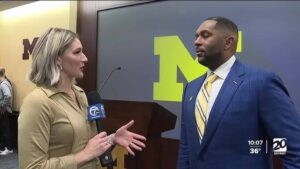
Title: Impact of Coach Bryan McClendon’s Departure on Wide Receiver Travis Smith’s Decision
Travis Smith, a highly-rated four-star wide receiver from Atlanta Westlake, recently shared his candid thoughts on the departure of wide receivers coach Bryan McClendon from the University of Georgia to the Tampa Bay Buccaneers. In an interview conducted at the Under Armour Atlanta Camp, Smith revealed that he learned about McClendon’s move through media reports and missed calls from the coach himself.
Smith’s initial reaction to McClendon’s departure was one of surprise and uncertainty. He acknowledged the significance of McClendon in his decision-making process, stating that the coach played a pivotal role in his consideration of committing to Georgia. The news of McClendon’s departure prompted Smith to reassess his perspective on his collegiate options and highlighted the impact of coaching staff changes on recruits’ decisions.
The departure of Coach McClendon represents a significant loss for the University of Georgia’s football program, particularly in the recruitment of talented prospects like Travis Smith. McClendon’s departure to the NFL underscores the competitive landscape of collegiate football and the allure of professional opportunities for coaching staff. For Smith, McClendon’s absence introduces a new factor to consider in his decision-making process, as he must now evaluate Georgia’s coaching staff under new leadership.
Smith’s comments reflect the importance of personal relationships and coaching connections in the recruitment process. McClendon’s departure has disrupted the rapport and trust that Smith had developed with him, prompting a reevaluation of his options and priorities. Smith’s willingness to explore other opportunities demonstrates the fluidity of the recruiting landscape and the impact of coaching changes on recruits’ decisions.
Despite the uncertainty caused by McClendon’s departure, Smith remains open to considering Georgia as a potential destination. However, he emphasizes the need for further information on the coaching staff’s new plans and expresses a desire to understand how McClendon’s absence will affect his potential role within the program. Smith’s comments highlight the complex dynamics at play in collegiate recruiting and the importance of transparent communication between coaches and recruits.
For Smith, McClendon’s departure represents a significant shift in his recruitment process and forces him to reassess his priorities and preferences. The departure of a key coach like McClendon raises questions about continuity and stability within Georgia’s football program and introduces an element of uncertainty for recruits like Smith. As Smith navigates the recruiting process, he must weigh the impact of coaching changes on his collegiate experience and consider how Georgia’s coaching staff under new leadership aligns with his goals and aspirations.
Moving forward, Smith’s experience serves as a reminder of the ever-changing nature of collegiate recruiting and the importance of adaptability and resilience for both recruits and coaching staff. McClendon’s departure highlights the volatility of coaching positions in collegiate football and underscores the need for recruits to carefully evaluate their options and consider all relevant factors in their decision-making process.
In conclusion, Travis Smith’s candid comments regarding Coach Bryan McClendon’s departure from Georgia to the NFL provide valuable insight into the impact of coaching changes on recruits’ decisions. Smith’s reaction underscores the significance of personal relationships and coaching connections in the recruiting process and highlights the challenges recruits face in navigating coaching changes. As Smith continues to explore his collegiate options, he must carefully consider the implications of McClendon’s departure and evaluate how it aligns with his goals and priorities as a student-athlete.






